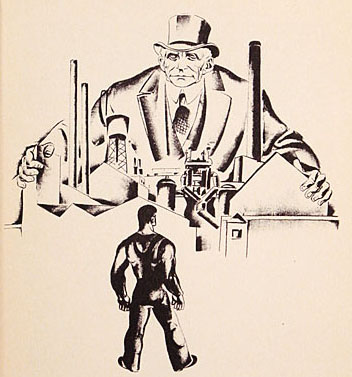Please read the short essay, or just click the answers to these simple questions. You may need to *enable popups.
1. Which of these is more likely a capitalist?
* A Prince of Saudi Arabia with an income of over $5,000,000/year
* A highly trained computer specialist making over $300,000/year
* A farmer who works much harder than any of his 300 employees and does so much charity work that his actual income is less than $25,000/year
* The proud owner of a highly successful computer repair shop who has two employees and rakes in $100,000/year
2. Which of these is more likely a worker?
* A woman who sells cosmetics door to door and brings in $75,000/year
* A farmer who works alone from "sun to sun" for less than $30,000/year
* A woman with a small cosmetics shop who brings in $50,000/year
* The young man who is "starting at the bottom" in his father's factory with a salary of $17,500/year
3. Why do we care whether activities come from workers or capitalists?
* Their activities impact the middle class, which is the majority of people
* The two classes are quite different, and their activities are likely to be contradictory
* Capitalists make more sense, and that is why they are in power
* Workers are morally superior to capitalists
*If popups don't work when you click on the answers, you will probably get a yellow line across the top of your screen. Click on it and choose "temporarily enable popups."
 |
What Do Marxists Mean by "Class?" |
In previous lessons, we've already learned that the material world, not the abstract world of ideals, determines what happens. We also learned that, in the largest and most general sense, people's attitudes are determined by their material situations. (Being determines consciousness).
Now, we are going to account for the fundamental differences between large categories of people, or different classes. If different groups have different material circumstances, it stands to reason that they would have different attitudes. Bosses do not have the same point of view as their employees. While employees are generally for high wages and good job benefits, employers are almost always against them. They have these different and highly contradictory opinions because of their extremely different material circumstances.
Keep in mind that we are not talking about individual thoughts, opinions, or people. We are talking in the largest and most general sense about large groups.
Marx and Engels made it clear that the people who primarily make their living from owning the means of production (capitalists) have quite a different set of opinions and attitudes than the large class of people who do not own the means of production. Those who do not own the farms and factories generally sell their labor power to those who do. Workers and capitalists tend to have very different opinions and attitudes.
Workers might want decent health care, but capitalists try to keep them from it. Workers might want free college tuition, but capitalists oppose it. Workers might want international understanding and an end to war (since they are the ones who have to fight and die), while capitalists see their material interests in continued war and hostility. Workers are generally for fair treatment for everybody, while capitalists find racism, male chauvinism, and homophobia profitable. Workers would like to understand the world better, while the capitalists sincerely hope they won't.
One could easily split hairs all day in trying to decide what income levels and what occupations belong to which class, but such a pastime is not good for much more than idle amusement. A worker is not a member of the working class because he/she works, and a capitalist does not belong to his/her class because of income. One class makes its living primarily from owning the means of production, and the other class primarily makes its living by selling labor power. On vital issues, the two classes oppose one another.
A third class exists in the uncertain zone between the capitalists and the workers. This "middle" class may be small shop keepers, professionals, or artists. Their role in politics is also uncertain. The majority of them usually follow whichever of the two dominant classes is ascending. They are usually split on the issues and cannot, over any useful period of time, stay together.
In the past and in some countries today, other classes exist. Slaves and kings, for example, do not fit into our definitions of workers, capitalists, and middle class. There are also criminals, prisoners, and mentally disabled people who do not fit easily into the main categories. In the largest and most general sense, though, it is workers and capitalists who determine modern events.

Feedback? Send an email